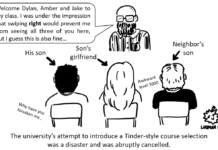Starting this spring term, UW will exclusively use peerScholar as the tool to provide group and peer feedback. This decision came in the wake of the possibility that the former peer feedback evaluation tool, PEAR, may not be supported moving forward.
According to peerScholar’s write-up on their vision, the founders believe that the current education system is out of balance and that students are solely being taught information and not being taught the “core cognitive skills” that are essential to leaders and innovators of the future. The skills listed include critical thought, creative thought, effective communication, and the ability to identify one’s strengths and weaknesses accurately. To bridge this gap, peerScholar set up its platform in such a way that will allow students to build and practice these skills which are considered “necessary” to succeed in the current workplace.
This tool allows students to interact anonymously, providing feedback to one another on their work. Hypothetically speaking, let’s say that I am working on an essay. Before turning that essay in for final submission and grading by the course instructor or TA, I can submit it to peerScholar for my peers to comment on and provide general feedback about my assignment.
This process in itself is what the founders of peerScholar find crucial. By following this process and leveraging this platform, students are being taught the “cognitive skills” that the founders of peerScholar claim are being lost in the current education system. Providing and receiving feedback will hone in on essential communication skills, while viewing and acting on those comments will help students begin to develop essential critical thinking skills. It will also help students to begin to identify their strengths and weaknesses. The beauty of this all — and what I find to be most attractive — is that this platform will allow you to receive feedback on an assignment before a final grade is submitted. Naturally, the assumption is that this tool will lead to students receiving better grades as feedback can be considered before final submission.
It is worth noting that UW performed an environmental scan of 27 different platforms while determining which would be the best to implement. The university shortlisted three companies that would be best to serve the needs of the community — including Kritik and Peerceptiv — before deciding on peerScholar.
PeerScholar scored 97 per cent in its ability to meet peer review needs and a score of 100 per cent in its ability to meet group evaluation needs. It is fair to say that UW expects peerScholar to be a tool that is used extensively to assist students in their learning journey.





























